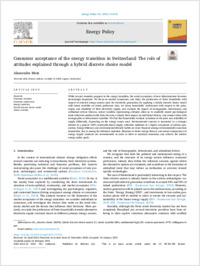Consumer acceptance of the energy transition in Switzerland : the role of attitudes explained through a hybrid discrete choice model
- Motz, Alessandra Facoltà di scienze economiche, Università della Svizzera italiana, Svizzera
-
16.02.2021
Published in:
- Energy policy. - 2021, vol. 151, no. April, p. 15 p
Consumer attitudes
Consumer preferences
Energy transition
Hybrid discrete choice model
Latent variables
English
While several countries progress in the energy transition, the social acceptance of new infrastructures becomes increasingly important. We focus on market acceptance, and study the preferences of Swiss households with respect to selected energy sources used for electricity generation. By applying a hybrid discrete choice model with latent variables on stated preference data, we assess households’ preferences with respect to the price, origin, and reliability of their electricity supply, and evaluate the impact of demographic, behavioural, and attitudinal drivers thereon. Latent variables representing attitudes allow us to explicitly model psychological traits otherwise unobservable from the data, evaluate their impact on individual choices, and connect them with demographic or behavioural variables. We find that households evaluate variations in the price and reliability of supply differently, depending on the energy source used. Environmental concern is associated to a stronger interest in a generic 100% renewable-based supply, informed optimism to a higher acceptance of nuclear generation. Energy illiteracy and environmental-friendly habits are more frequent among environmentally conscious households, less so among the informed optimists. Measures to foster energy literacy and ensure transparency of energy supply contracts are recommended in order to elicit or maintain consensus, and achieve the desired energy policy goals.
- Language
-
- English
- Classification
- Economics
- License
- Open access status
- hybrid
- Identifiers
-
- RERO DOC 330552
- DOI 10.1016/j.enpol.2021.112152
- ARK ark:/12658/srd1319310
- Persistent URL
- https://n2t.net/ark:/12658/srd1319310
Statistics
Document views: 208
File downloads:
- Fulltext: 447
